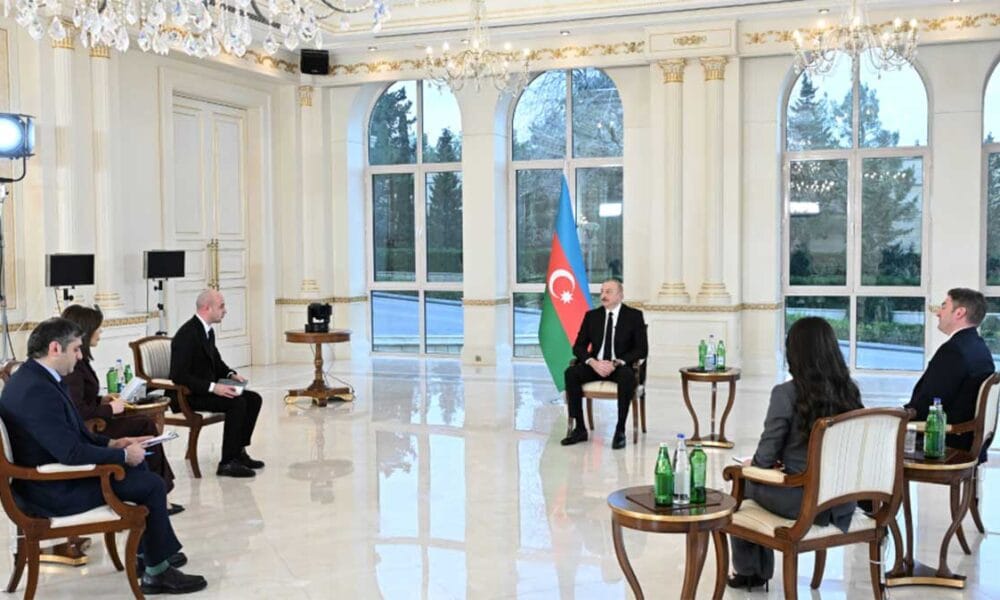Recent pronouncements by Azerbaijani President Ilham Aliyev, particularly his January 7 interview, have intensified concerns about regional stability in the South Caucasus. Aliyev’s persistent demands for the opening of the so-called “Zangezur Corridor,” coupled with accusations of “fascism” directed at Armenia and calls for international restrictions on Armenian military capabilities, paint a picture of Azerbaijan’s increasingly assertive geopolitical strategy. These developments, set against the backdrop of Azerbaijan’s rapidly expanding military budget, raise serious questions about the prospects for lasting peace in the region.
Under Aliyev’s leadership, Azerbaijan has consistently pursued policies characterized by authoritarianism and state-sponsored anti-Armenian sentiment. Freedom House’s “Freedom in the World 2024” report classifies Azerbaijan as “Not Free,” citing systemic suppression of political dissent and restrictions on fundamental freedoms (Freedom House, 2024, freedomhouse.org). This suppression of internal opposition is mirrored by the external propagation of hate speech and the systematic erasure of Armenian cultural heritage in territories that came under Azerbaijani control following the 2020 conflict. Organizations like UNESCO and the European Commission against Racism and Intolerance (ECRI) have documented these destructive practices, highlighting their detrimental impact on cultural preservation and inter-ethnic relations (UNESCO, various reports, unesco.org; ECRI, various reports, coe.int/en/web/ecri). These actions create a climate of hostility and mistrust, directly contributing to the current escalation in rhetoric.
In sharp contrast, Armenia has been recognized for its progress in democratic development, standing out as a relatively democratic state in a region marked by authoritarian tendencies. Armenia’s performance on various human rights and freedom indices contrasts sharply with Azerbaijan’s record. Aliyev’s frequent criticisms of France, the European Union, and other democratic nations can be interpreted as an attempt to discredit democratic values and deflect attention from his own regime’s human rights abuses. This strategy attempts to create a false moral equivalence, justifying Azerbaijan’s actions by portraying them as a defense against alleged external threats to its sovereignty.
A critical element of Azerbaijan’s assertive posture is its substantial military buildup. In 2025, Azerbaijan’s military budget reached an estimated $5 billion, a considerable increase from the $3.2 billion reported by the Stockholm International Peace Research Institute (SIPRI) in 2023 (SIPRI, 618, sipri.org). This significant disparity in military spending compared to Armenia’s estimated $1 billion defense budget underscores the growing military imbalance in the region. This asymmetry in military power creates a sense of vulnerability for Armenia and emboldens Azerbaijan’s more aggressive stance.
This increased military expenditure reflects Azerbaijan’s intention not merely to deter potential threats but to exert coercive pressure and potentially pursue further military objectives. Aliyev’s demands that nations like France cease supplying arms to Armenia should be viewed through this lens. By attempting to restrict Armenia’s access to defensive weaponry, Azerbaijan aims to solidify its military advantage, potentially creating conditions for future military actions. Therefore, Armenia’s efforts to modernize its own armed forces are not acts of provocation but rather necessary measures for self-defense in a precarious security environment.
Aliyev’s accusations of “fascism” in Armenia are not supported by evidence and serve primarily as a propaganda tool. These claims aim to delegitimize Armenia on the international stage and sow discord within Armenian society. However, reports from organizations like the Council of Europe have documented instances of hate speech and the glorification of violence in Azerbaijan, including the widely condemned heroization of Ramil Safarov, an Azerbaijani soldier convicted of murdering an Armenian counterpart during a NATO-sponsored program (Council of Europe, various reports, coe.int). These actions paint a different picture, raising serious concerns about the promotion of intolerance and violence within Azerbaijani society.
The rising tensions in the region, Azerbaijan’s unprecedented increase in its military budget, and Aliyev’s aggressive rhetoric underscore the urgent need for decisive and consistent actions from the international community. However, strengthening Armenia’s internal resilience is equally critical. While international support is indispensable, its effectiveness will be greater if Armenia can present itself as a strong and unified state, prepared to confront emerging threats.
Armenia’s state and military institutions must prioritize the continuous modernization of defense capabilities. This effort will not only help to neutralize the military imbalance but also serve as a crucial factor in ensuring regional stability. Yet, military strength alone is not sufficient. Public unity and national cohesion will play a pivotal role in organizing effective resistance, overcoming external pressures, and maintaining internal stability.
In this context, rethinking and reinforcing the values of national sovereignty and democracy are vital. Broad public engagement in defending national interests will not only enhance Armenia’s resilience to external pressures but also send a clear message to the international community about Armenia’s determination to protect its rights and territorial integrity.
Ultimately, achieving regional peace and stability requires Armenia to align its internal strengths with international diplomatic support. By developing and implementing an effective strategy, Armenia can shape a situation in which its independence and security are safeguarded even in the face of the most challenging circumstances. The question remains: is Armenia ready to harmonize its internal and external capacities to confront emerging challenges and strengthen its position in the South Caucasus?
References:
Freedom House. (2024). Freedom in the World 2024. freedomhouse.org
SIPRI. (2023). SIPRI Military Expenditure Database. sipri.org
UNESCO. (Various reports). unesco.org
ECRI. (Various reports). coe.int/en/web/ecri
Council of Europe. (Various reports). coe.int

